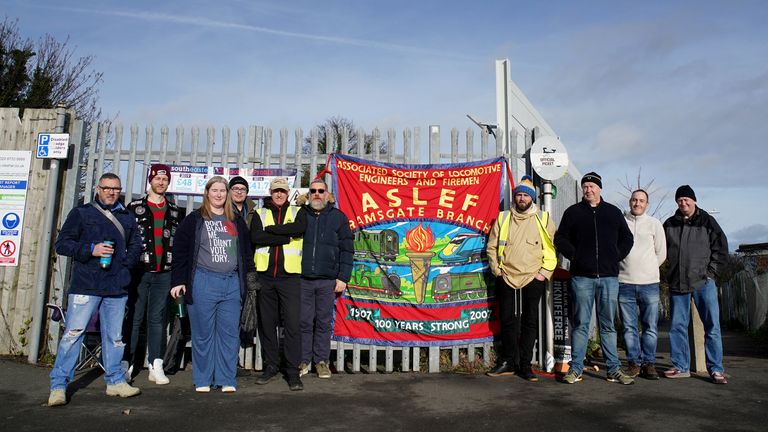Pay offer made to Aslef train drivers as rail strike disruption continues on Saturday | UK News
Train operating companies have offered the drivers’ union a two-year deal in a bid to resolve the bitter pay dispute – as strikes across the rail network continue on Saturday.
The Rail Delivery Group (RDG) said it was offering a “landmark outline proposal” in exchange for a pay increase of 4% for 2022 and 4% for this year.
It also includes a commitment to no compulsory redundancies until at least 31 March 2024.
Steve Montgomery, chairman of the RDG, said: “This is a fair and affordable offer in challenging times, providing a significant uplift in salary for train drivers while bringing in common-sense and long-overdue reforms that would drive up reliability for passengers and allow the railway to adapt to changed travel patterns.”
Drivers’ union Aslef said it had not seen the offer.
It comes as RMT union members at Network Rail and 14 train companies are continuing with a 48-hour strike which is set to cripple services across the country again on Saturday.
Only around one in five trains will run, with services starting later and finishing earlier.
The RMT has rejected a pay offer from train companies of 4% last year and 4% this year, saying a “host of unacceptable changes” were included such as the widespread expansion of driver-only operation on train services.
It argued that while rail workers have had their pay frozen between March 2020 and September 2022, official data showed that the private train operators made £310m in taxpayer-funded profits during the same period.
By September this year, that figure will be in excess of £400m, all of which can be turned into shareholder dividends, said the union.
RMT general secretary Mick Lynch said: “While the secretary of state and the Rail Delivery Group spin about the need for reform to fund pay rises, the truth is that the money was always there but it’s being salted away by a gang of profiteers and their mates in the government.
“It’s outrageous that the interests of workers, passengers and the taxpaying public are all sacrificed to the greed of a handful of private transport companies who are being guaranteed profits when they can’t run a railway even when we’re not on strike.”
Read more:
When have industries gone on strike and what has it achieved?
New strike laws to ‘ensure basic level of service’ confirmed
The latest strikes are part of a long-running pay dispute between rail staff and the train operating companies, that has caused widespread disruption to services across the UK.
A Department for Transport spokesperson said: “Passengers have rightly had enough of rail strikes and want the disruption to end.
“Unions should step back from this strike action so we can start 2023 by ending this damaging dispute.”
